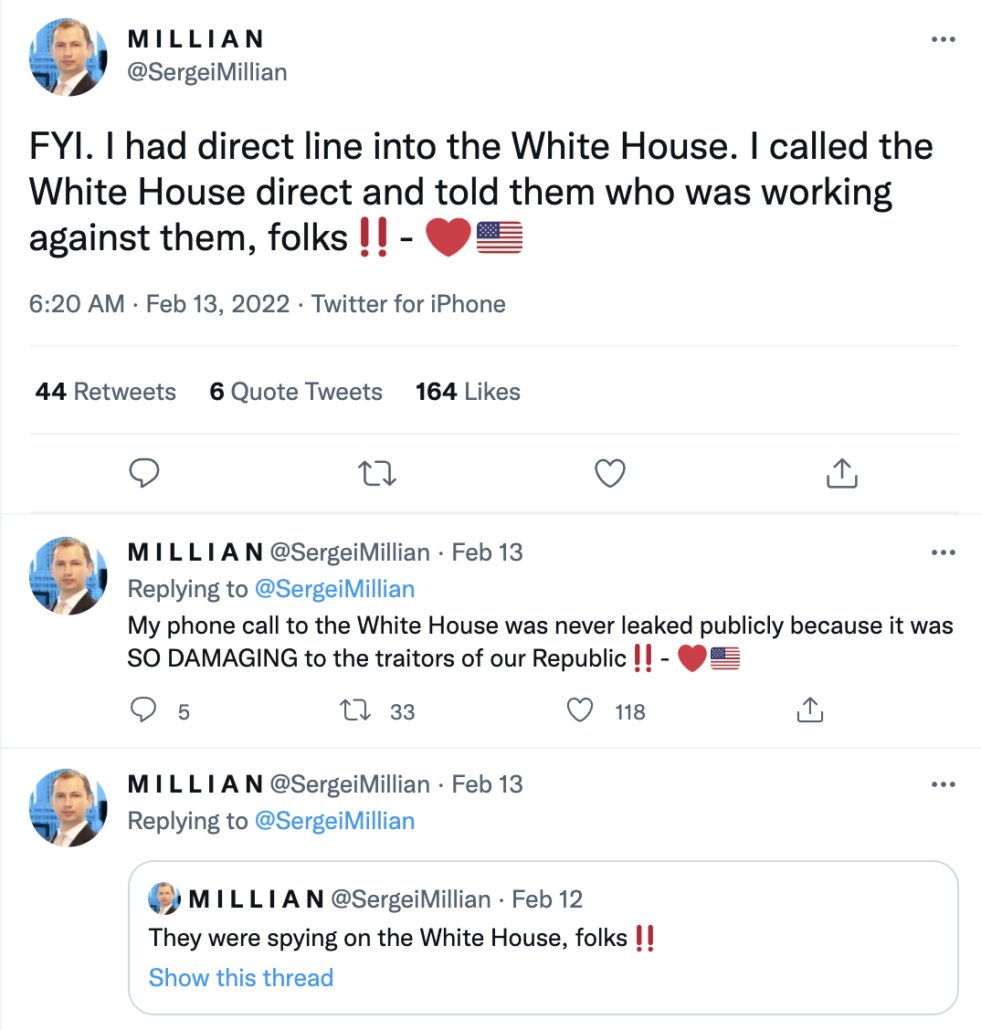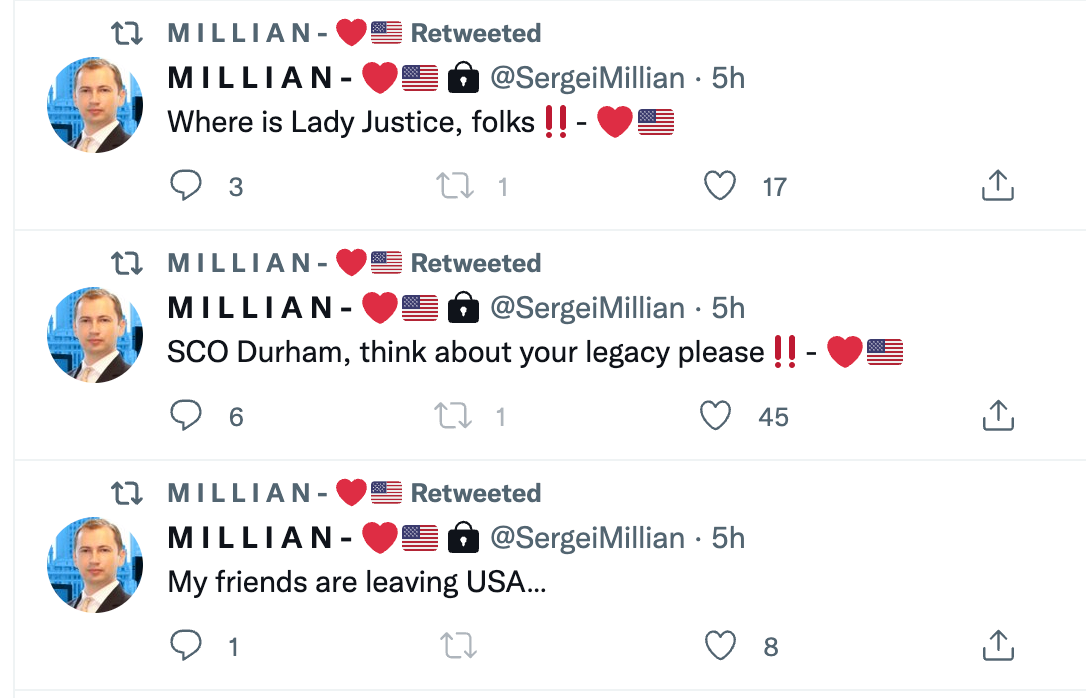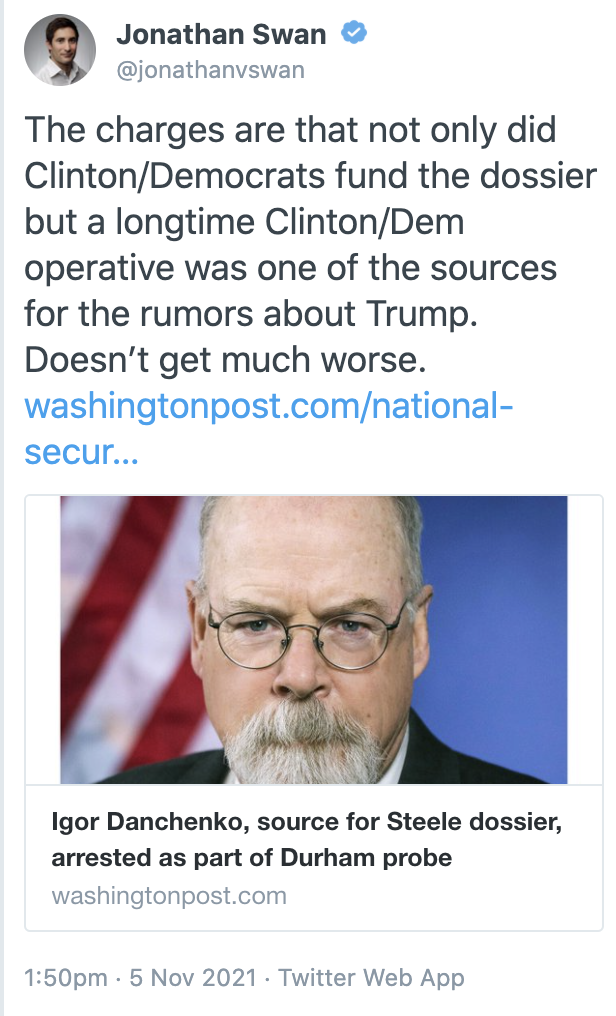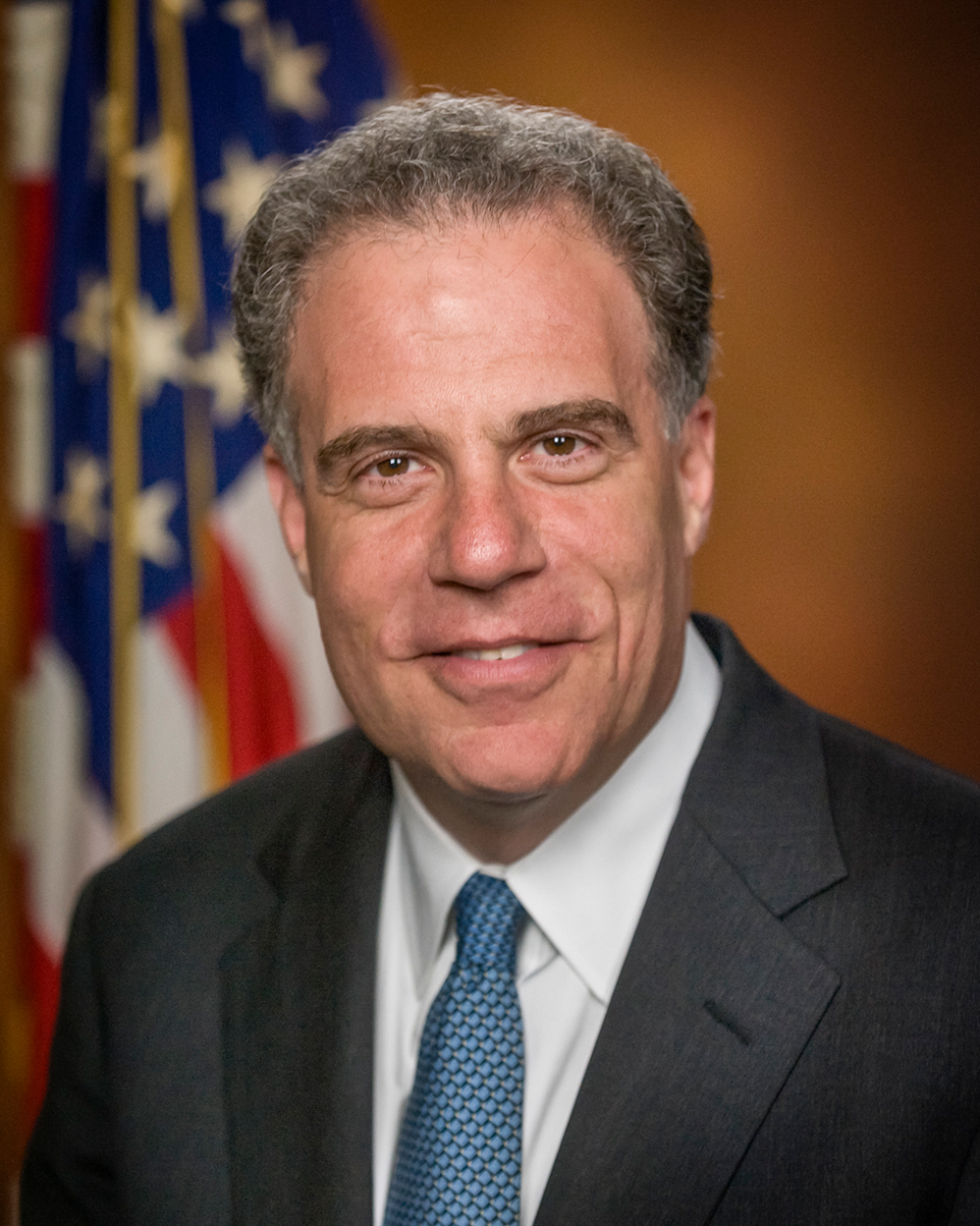“It Certainly Sounds Creepy:” John Durham Adopts the “Coffee Boy” Defense
At one point during his redirect of FBI Supervisory Analyst Brian Auten yesterday, John Durham was so desperate to insinuate that the Crossfire Hurricane/Mueller team was incompetent, that he even argued that they didn’t investigate Sergei Millian thoroughly enough.
Durham was trying to suggest that Auten should have discovered and pulled the call records for a 212 number, in addition to the 404 prefix number around which Durham has built his entire case.
Q. Right. Do you recall whether or not the FBI ever did — in Crossfire Hurricane ever run that number down to see what the records might show?
A. The 212 number?
Q. Correct.
A. It’s possible. I don’t have a recollection of that while I sit here now.
Q. If you had done that, if the investigators had done that, is that something you think you would recall?
A. Not necessarily.
Q. There’s some probability that if you had actually run the numbers to the ground, you would remember that?
A. No. But, I mean, for a number trace, that may have been one of the analysts that I had under me. If we did it, again, I don’t know whether it was run or not.
Durham was trying to suggest that the FBI should have found a second phone number used by Sergei Millian that — it appears from Durham’s own exhibit list — Durham either didn’t know about or wanted to keep hidden. In the process, he implied that Mueller didn’t investigate Millian, whom Durham still believes was a victim in all this, aggressively enough.
I predicted, on multiple occasions, that Durham would be destroying his purported victims in a claimed effort to avenge them.
He should have listened to me.
Because thus far, Durham’s vengeance for Trump and his flunkies has done more to air details of the criminal investigations into everyone Durham claims to be defending than it has served to present proof of Danchenko’s guilt.
Close to the beginning of his cross-examination yesterday, Danchenko attorney Danny Onorato got Auten to lay out that three of the original subjects of the Crossfire Hurricane investigation — everyone but Carter Page — were convicted.
Q Now, you also understand that when Crossfire Hurricane opened — I think you testified yesterday that there were four people who the government was looking at, correct?
A Correct.
Q Papadopoulus?
A Correct.
Q Paul Manafort, the former campaign manager?
A Correct.
Q Carter Page?
A Correct.
Q And the fourth?
A Michael Flynn.
Q And are you aware that — I think Mr. Durham asked you — whether Mr. Page was ever charged or convicted of a crime?
A Yes, he did. He asked me that.
Q And what did you tell him?
A No.
Q What about the other three people?
A Well, Mr. Manafort, yes.
Q Was he convicted?
A Yes.
Q Next person?
A Michael Flynn.
Q Convicted?
A Yes.
Q Okay. Next?
A George Papadopoulos.
Q Okay. And?
A Yes.
Q So three of those four were convicted of crimes?
A Correct.
Q Based on the Crossfire Hurricane investigation?
A As it went over to the special counsel’s office, yes.
Q Okay.
Even before rehearsing the results of the Mueller investigation, Onorato had Auten describe that the Australian tip that predicated the entire investigation pertained to George Papdopoulos.
Okay. Now, given your background with respect to, you know, analytics and, you know, your work history, is it fair to say that you were assigned to the Crossfire Hurricane investigation?
A Yes.
Q Now, a quick summary would be to say that Crossfire Hurricane started because someone who was represented to be a high-level Trump campaign official and advisor, Mr. Papadopoulos, allegedly indicated that the Russians would help leak damaging information to the Clintons and Obamas, right?
A They had received a suggestion that they could be helped that way, yes.
Q Again, that person was George Papadopoulos, right?
A That is correct.
Q Okay. And the FBI opened an investigation on July 31, 2016?
A Yes.
Q That was before you had any information regarding the Steele dossier, right?
A That is correct.
Q That was before you even — so you would agree with me that the opening of that investigation had nothing to do with the Steele information; it had nothing to do with the initiation of Crossfire Hurricane?
A Correct.
Q You would agree that the goal of Crossfire Hurricane was to determine whether or not there was truth to the allegation that a friendly foreign government had provided the U.S. with respect to Russia and collusion between the Trump administration?
A That is correct. [my emphasis]
Onorato was laying the foundation — as I also predicted — to show proof that Durham’s entire basis for claiming that Millian could not have called Danchenko in July 2016 was easily disproven with basic details of Millian’s cultivation of Papadopoulos in the very same time period. This wasn’t about the fact that Papadopoulos admitted he had lied to cover up his ties with Russian-linked figures.
But it seems to have made Durham nervous that the jury would notice he had.
Perhaps because of this, Durham several times made really defensive comments about George Papadopoulos.
Durham spent part of his redirect of Auten attacking his claim that Papadopoulos was a “high level advisor to the Trump Campaign” (which arose from Onorato’s accurate description of the tip from Australia, as I noted in bold above), delivering the “Coffee Boy” defense Trump once used with great flourish to the “ladies and gentlemen of the jury.”
Q. Okay. Now, there were a number of questions that defense counsel asked you that you — well, there were a number of questions that counsel asked you that I want to probe a little bit more deeply. Mr. Onorato asked you or made reference to George Papadopoulos and said — and said — incorporated in his question, that George Papadopoulos was a high level advisor to the Trump Campaign, and you said yes. Well, tell the ladies and gentlemen of the jury with respect to George Papadopoulos, how old was George Papadopoulos in the 2016 election?
A. I want to say Papadopoulos was in his 30s.
Q. How about 28? Does that refresh your recollection?
A. It could be around 28.
Q. And was he such a high level advisor that he still had on his resume that he was in a student UN panel?
A. No, that was on his resume.
Q. Right. So this person that you agreed to was a high level advisor to Trump, the Trump Campaign, was a 28-year old who still had on his resume that he was a UN — a student UN person? [my emphasis]
When Auten tried to remind Durham that Trump himself had pitched Papadopoulos as a key foreign policy advisor, Durham interrupted.
A. I would say that part of my articulation of that deals with the fact that Mr. Papadopoulos was part of the small group of advisors that were named, I believe, in March of 2016
Q. Right.
A. For the president — for the former president.
Q. With respect to high level advisor, you don’t have any idea whether Papadopoulos even, you know, had occasion to talk to Trump, do you?
A. Well, he was at the meeting that — that was announced —
Q. He was at one meeting —
MR. ONORATO: Can the witness finish his question — his answer?
MR. DURHAM: Sure.
Remember that Durham and Bill Barr went on a junket to Italy together to chase Papadopoulos’ conspiracy theories without ever interviewing Papadopoulos first (which he still has not done, three years later). And now he’s telling us Papadopoulos was just a low level coffee boy?
After attempting to debunk that people — like the former President, the former Attorney General, and he himself treated Papadopoulos as if he had credibility — Durham then tried to get Auten to agree that Mueller was more worried that Papadopoulos was an asset of Israel’s than Russia’s. When Auten tried to clarify that, no, Mueller investigated Papadopoulos for both, Durham interrupted again.
Q. And, in fact, with respect to Mr. Papadopoulos, isn’t it, in fact, true that, as to Papadopoulos, what the FBI thought it was more — of more interest in Papadopoulos was his relationship to Middle Eastern countries, not to Russia?
A. Actually, I would argue that it was a combination of both. I think —
Q. And I — I’m sorry.
THE COURT: Go ahead. Finish your answer.
THE WITNESS: I think I’ve asserted in testimony that it was a both and.
Before this, Durham twice went on at great length suggesting that Millian couldn’t be a spy recruiting George Papadopoulos — even though Papadopoulos himself described Millian as “a very shady kind of person” — because they were discussing real estate and energy, not “collusion” with Russia. He did this first in a morning hearing before the jury came in.
The defendant has provided what he has premarked as Defendant’s Exhibit 480, 4-8-0, which is an email, a LinkedIn message from Millian to George Papadopoulos. Unless the defendant is going to somehow explain to the jury what Millian and Papadopoulos were communicating about at this period of time, then the Court should not permit it. Papadopoulos and Millian, as I think the defense knows from the discovery in this case, were exchanging any number of emails or Facebook exchanges or LinkedIn all about real estate, potential real estate transactions.
And so what the defense would be asking the jury to do is to draw some adverse inference that there was something going on between Millian and Papadopoulos that they really don’t know about, but it certainly sounds creepy. Well, in fact, if you look at what the communications were, as I say, between Papadopoulos and Millian, they are all about real estate, potential real estate investments.
[snip]
MR. DURHAM: 486 is from Millian to Papadopoulos. Again, you know, its irrelevant to these proceedings, but for the same reason, in the government’s view, it would be inadmissible unless we want to get into evidence relating to what Papadopoulos and Millian were doing at or about the time these email exchanges were occurring. [my emphasis]
He did it again in the middle of Onorato’s cross in the guise of voir dire before admitting the communications between Millian and Papadopoulos.
Q. And do you remember what Papadopoulos and Millian were involved in that generated these numbers?
A. I don’t recall exactly what they were involved in, but it was —
Q. But was it pretty much they were involved in real estate or investment discussions over a long period of time?
A. That, I don’t recall exactly.
Q. Well, how about generally? Do you generally refer — recall that Papadopoulos and Millian were involved in discussions about real estate projects and the like?
A. In January of…
Q. Well, this whole period that’s reflected in Defendant’s Exhibit 403.
A. Yeah, again, I don’t know if I — I don’t know if I can speak to that at this point.
Q. Well, you — you were the analyst — that supervisory analyst, correct?
A. Yes.
Q. Did you recall, sir, what it was that Mr. Millian was involved in, the kind of investments?
A. Yes, he was involved in investments and the like.
Q. Right.
A. But I don’t know if I can speak to, at this point, these phone records being tied to any real estate deals or anything of that sort.
Q. Right. So all of these records have shown there was contact between the two of them, correct?
A. Correct.
Q. And did you know that Millian was involved in the energy sector as well?
A. Yes, correct.
Q. And did you know that Papadopoulos was talking about getting involved in the energy sector in the Middle East?
A. Yes, I did know that.
Q. Does that refresh any recollection as to whether or not the contact between Millian and Papadopoulos had to do with energy and other investments?
A. Again, I am familiar with both of those things. I don’t know if that is what this document was actually written for.
Q. Okay. And there’s nothing in this document that tells you what it is about, correct?
A. No. Gmail talks about — there are a couple of references on — it’s not — it’s Bates Number — last Bates number is 105262.
Q. Uh-huh.
A. And there are two paragraphs that talk about another individual involved with energy.
Q. Right. This is all about business, correct?
A. Again, I don’t know if all of this is about business. I know that there are paragraphs in here involving energy.
Q. Okay. So one can tell from this is that they were involved in exchanges of emails or the like, correct?
A. Correct.
Q. And it appears it has to do with energy, correct?
A. It might , yes. Again, there are a lot of — there are a lot of communications on here.
Q. Yes.
A. So I would not be able to state with any substance that these are all involving energy issues.
Q. You can’t say that because the document doesn’t tell the jury what it’s about, other than that it, at least it has partially to do with energy?
A. Correct.
Q. Between Millian and Papadopoulos, correct?
A. That’s what it appears, correct.
Q. So it would be unreasonable to conclude anything or draw any conclusions from this other than Papadopoulos and Millian were involved in investments in the energy sector, right?
A. I don’t know if I can say that it follows necessarily from this, that all of these things deal with that.
Q. That wasn’t my question, though.
A. Okay.
Q. My question was: It would be unreasonable to conclude from this document anything other than they were at least involved in talking about — the energy sector, correct?
A. I would say that from this document there may —
Q. Uh-huh.
A. — there are likely communications within this list of communications dealing with energy, though I cannot say, analytically speaking, that all of these deal with energy
Q. Fair enough. You know that Millian was involved in the energy sector and real estate?
A. I do recall that.
Q. And Papadopoulos is involved in the energy sector and real estate?
A. I recall that.
Q. And so this document doesn’t have anything to do, from looking at it on its particulars, anything to do with Russia and Russia collusion and the like, correct?
A. So the only thing that this has is — it has a list of — most of it is a list of communications between the two parties, dates, times.
Q. Okay. [my emphasis]
When he finally got the witness back and the exhibits admitted, Onorato mocked the way Durham had wasted all his time.
Q. Okay. And I’m glad that Mr. Durham took five minutes of my examination with you to talk about something I didn’t want to ask you about, okay? I don’t care if they were talking about going to the beech or vacation. It’s not relevant to —
He then noted that he really didn’t give a fuck what they were talking about. This was about metadata. Onorato was introducing it to show that the investigation into both Millian and Papadopoulos revealed that there were communications between the two men — communications not relying on the single cell phone that Durham bothered to obtain the call records for. Danchenko’s lawyer was showing that, during the same period when, Durham is arguing, Millian could not have arranged a meeting in New York with Danchenko because he was in Asia and the single phone the records of which Durham bothered to pull had been turned off temporarily, Millian had been arranging a meeting in New York with Papadopoulos.
Q. So the import of that document is that you were investigating Mr. Papadopoulos after Crossfire Hurricane, right?
A. In Crossfire Hurricane, yes.
Q. Right. But you got —
A. And special counsel.
Q. Right. And then Mr. Millian was also being investigated, right?
A. Correct.
Q. And so, the import of that is that there’s communication between Papadopoulos and Millian, and the FBI was documenting that because it was important, right?
A. Correct.
Q. Okay. It doesn’t — I don’t care about the contents of what they were discussing, just the fact that there was this relationship that you needed to explore, right?
Again, the primary purpose of introducing Papadopoulos was to show that the entire metadata-based argument that Durham will make about the impossibility of a call between Millian and Danchenko simply ignored publicly-known metadata from the very same period, metadata that the FBI believed was important.
Onorato was not trying to and does not need to prove that Millian was recruiting Papadopoulos as a Russian asset.
But the mere act of introducing these communications flipped the table, and Durham started making a desperate defense of two of the claimed victims he was championing.
Durham’s observation that all those communications “certainly sound[] creepy” was made outside the presence of the jurors. But in his bid to claim Papadopoulos was just a Coffee Boy, Durham himself introduced the possibility that two men he is attempting to claim were unfairly investigated really were engaged in “Russia collusion.”










